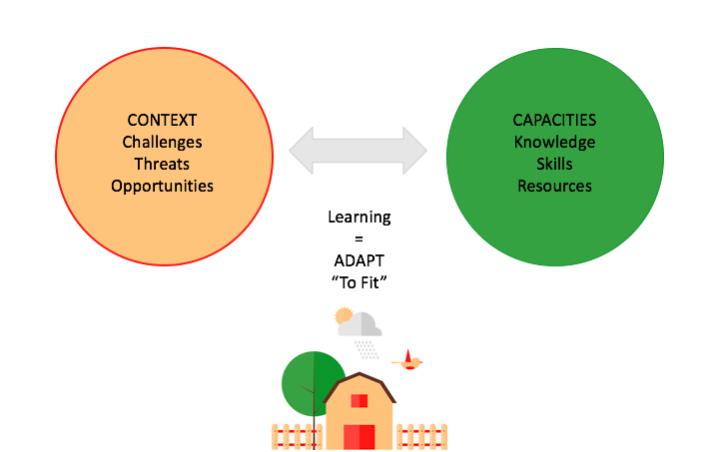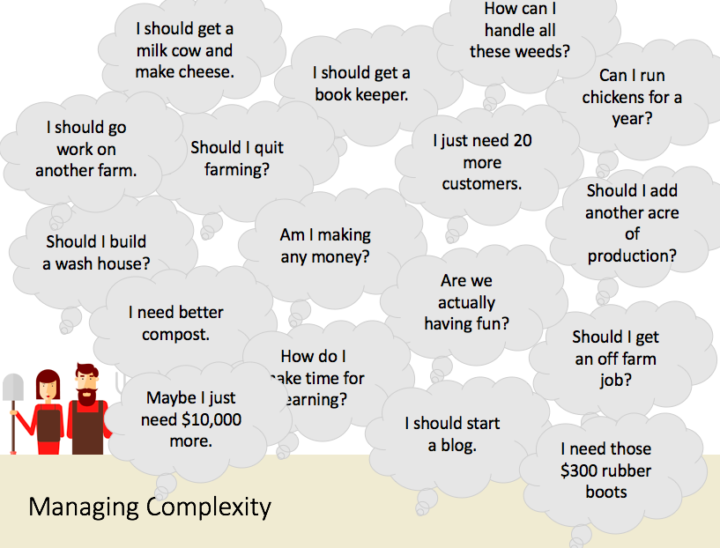Adapted from Dana Penrice and Ted Chastko’s Intro to Holistic Management presentation at the YA Kelowna and Vancouver Island Winter Mixers.
The nature of managing natural systems requires that we create farms and farm businesses that are adaptive. The challenge is that farming is complex and things are always emerging and evolving and we need to be able to adapt. In other words, we need to fit our skills capacities, resources to the context of threats, challenges and opportunities in which we’re working. 
As farmers, on a typical day, any number of ideas, questions and thoughts run through our head in a day. Does this seem familiar?

What Holistic Management offers is a framework that serves as a filter to manage the complexity of natural systems, filter our thoughts and ideas, and organize our thinking to help us make decisions that lead us towards our ultimate goal.

GET STARTED #1: UNDERSTAND YOUR CONTEXT
The place to start with Holistic Management is to understand the context, sometimes called the “Whole Under Management”. A useful exercise to get you started on this is identifying your 8 forms of capital. It is important to identify and include all of your decision makers in this process. One way to test if someone is a decision maker is asking if they would have veto power over the daily operations of your farm.
As you fill this out, you’ll notice the relationships between the different forms of capital, how they might be leveraged off each other or how they might be exchanged. This can be a powerful activity as you start farming and might feel like you don’t have a lot of resources.
Download the 8 Forms of Capital Exercise
GET STARTED #2: CREATING YOUR HOLISTIC GOAL
Once you have your context, you can start to outline what you vision is, where you are headed and how you will get there. This is included in your Holistic Goal.
This starts with a Statement of Purpose. Think of this as your North Star. As you get started, this might be a image, a quote or a mantra, something that gets you out of bed in the morning and gets you out to the field. This might change and evolved over time but its really important to write this down or draw it out because it really is the big WHY of what we are doing.
Quality of Life Statements relate to our values and how we want to live. These are “I am/We are” statements that describe the quality of life we seek to achieve. For example: “I am always learning.” or “We are healthy.”
Behaviours & Systems relate to your Quality of Life Statements in that this is what you have to practice in order to achieve the quality of life you want. So for example, if your Quality of Life states “We are healthy.” Your Behaviour and System might say something like “We produce nutrient dense, organic food.” or “We exercise daily.”
But the statements above on go so far if they are sustainable. This is where your Future Resource Base comes in. This refers to what pool of resources needs to be built in order for you to keep practicing your behaviours and systems and keep achieving your the quality of life you want.
Download the Holistic Goal Exercise
KEEP GOING:
This is the very tip of the iceberg to get you started with Holistic Management decision making. These exercises will hopefully get you started but the real value of Holistic Management is in creating feedback loops to stay adaptive by:
- Understanding Ecological Processes
- Knowing What Tools for Resource Management
- Planning (Financial Planning, Crop Planning, Grazing Planning, Marketing Planning, etc.)
- Using Testing Questions for Decisions and Actions
To dig deeper into these parts of Holistic Management, you’ll need to dig into some of these great resources:
- Holistic Management International – Online Courses, Downloads
- Holistic Management Canada – In Person Courses, Western Canadian Holistic Management Conference & Canadian Educators and Practitioners
- Holistic Management: A New Framework for Decision Making – Book by Alan Savory
Here are some other podcasts and videos to check out too:
- Farmers-to-Farmer Podcast with Daniel Brisebois Ferme Tourne
- VEG: Very Edible Gardens Holistic Management Videos
The exercise downloads in this document were created and kindly shared by Takota Coen of Grass Roots Family Farm and Deep Roots Design.